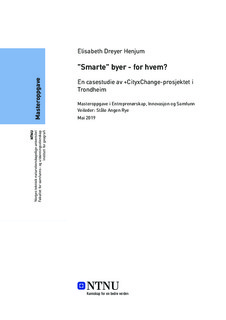| dc.description.abstract | Byutvikling er i stor endring både på grunn av en økende grad av urbanisering, og en dreining mot bærekraft og samskapning hvor alle aktører skal involveres i utviklingen. Smarte byer har i den senere tid kommet som en byutviklingsstrategi for å klare å håndtere utfordringene som oppstår en slik endring. I tråd med dette skiftet vil denne oppgaven se nærmere på Trondheim sin deltakelse i et Horizon2020-prosjekt for å bli en «smart» by. Oppgaven fokuserer på i hvilken grad innbyggere blir involvert i prosjektet. Gjennom å se på forståelsen ulike aktører har på begrepet innbyggermedvirkning ønsker jeg å se på om den oppfattelsen påvirker mulighetsrommene som kan skapes i Trondheim gjennom prosjektet.
For å besvare min problemstilling benyttes en kvalitativ tilnærming til datainnsamlingen. Jeg har gjennomført 14 intervjuer med aktører fra NTNU, Trondheim kommune og næringslivet. Studien baserer seg også på en dokumentanalyse av prosjektets utlysningstekst fra EU og søknaden utformet for å vinne prosjektet.
Oppgaven er basert på teori omhandlende bærekraft, kvadruppel helix, prosjektsamarbeid, translasjon og innbyggermedvirkning. Sammen med mine empiriske funn, har oppgaven avdekket at aktørenes forståelse av begrepet innbyggermedvirkning avhenger av flere faktorer. Det kommer frem at flere mulighetsrom kan skapes gjennom prosjektet. Imidlertid har ikke innbyggerne vært involvert i søknadsprosessen slik at mulighetsrommene som skapes ikke nødvendigvis samsvarer med det innbyggerne ønsker. Samtidig synes det ikke å ligge en konkret plan på hvordan man skal få innbyggerne til å ta i bruk, eller delta i de forskjellige løsningene som skal utvikles i prosjektet. Disse funnene viser til at aktørenes forståelse av innbyggermedvirkning har påvirket hvilke mulighetsrom som skapes i byen. | |
| dc.description.abstract | Urban development is changing rapidly, due to an increasing degree of urbanization, a shift towards sustainability and co-creation, where a variety of interested parties are involved in development. “Smart Cities” have recently emerged as an urban development strategy to cope with this change and the challenges it presents. In line with this shift, this study will look closely at Trondheim's participation in the Horizon 2020 project with the aim of becoming a “Smart City”. This research focuses on the extent to which citizens are involved in the project. By looking at the variances in the definition on the concept of citizen involvement, the aim was to ascertain whether these variances would affect the creation of opportunities during the life cycle of the Horizon 2020 project in Trondheim.
To answer this question, a qualitative approach was used for data collection. In total I have conducted 14 interviews with interested parties from NTNU, Trondheim municipality and the business community. My is also based on a document analysis of the project's call text from the EU and the application designed to win the project.
Based on the theory of sustainability, quadruple helix, project collaboration, translation and citizen involvement and my empirical findings, the research has revealed that different players’ definition of the concept of citizen involvement depends on several factors. The citizens were not consulted during the project application process which defines the scope of the opportunities created, as such this could mean that these opportunities may not correspond exactly to what the citizens wants. In tandem to this, it does not appear that there is a concrete plan in place on how to get the citizens to use, or participate in the different solutions that will be developed in the project. These findings indicate that the understanding of citizen involvement has influenced which possibilities that will be created in the city. | |
